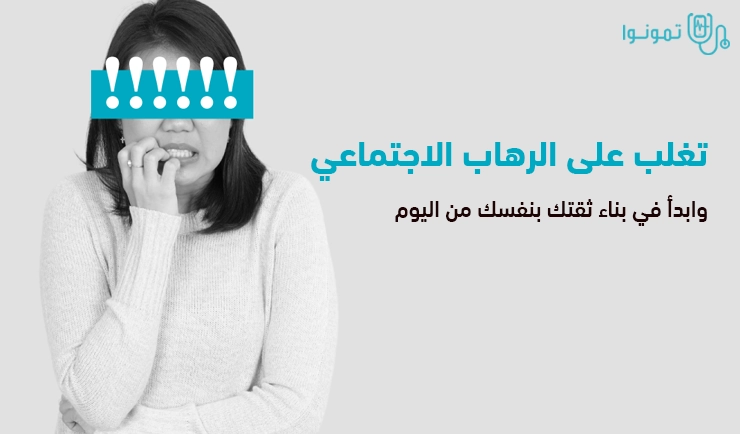Social Phobia | How to Treat Social Phobia Advanced Methods

Do you feel extremely nervous when speaking in front of people or entering social situations? If you suffer from these feelings, you are not alone. Many people around the world suffer from social phobia treatment, which greatly affects their daily lives. But do not worry, solutions are available. In this article, we will review in-depth details about social phobia, the different types of social phobia, and how to treat it. We will talk about treating social phobia with medications and their benefits, in addition to treating social phobia without medications as other effective options. In this article, we will help you understand this topic comprehensively and learn the best ways to deal with it.
Social Phobia
Social phobia is a state of excessive fear and anxiety that a person feels in social situations, where they have difficulty interacting with others or speaking in front of them. It is also known as social anxiety, where those affected by it suffer from a constant fear of being criticized or judged negatively. What is social phobia? It is a psychological disorder that causes a person to feel uncomfortable in places where they expect to interact with others, such as parties or meetings.
Social phobia is one of the most common types of psychological disorders among people. It requires medical consultation and is considered one of the most common psychological diseases as it requires treatment of a psychological disorder. One of the most prominent causes of social phobia is exposure to negative experiences in the past such as criticism or ridicule, which causes the person to constantly fear falling into the same situations.
Types of Social Phobia
Social phobia is a mental disorder characterized by excessive fear of social interaction and situations that require interaction with others. This disorder can manifest itself in several forms, as the types vary depending on the type of situations that cause anxiety. Here are some types of social phobia in detail:
Public speaking phobia
This is one of the most common types of social phobia, where a person suffers from excessive fear when speaking in front of a group of people or in public places. A person with this type of phobia feels afraid of making mistakes or being noticed negatively by others.
Job interview phobia
This type of social phobia occurs when a person feels extreme anxiety before or during a job interview. This may cause the individual to perform poorly in the interview due to excessive tension, affecting their chances of getting the job.
Public eating phobia
People who suffer from this type of phobia feel shy and anxious when eating in public places such as restaurants or malls, for fear that others will notice them and start criticizing them.
Stranger interaction phobia
This type is the fear of interacting with people the individual does not know. People with this type of phobia have difficulty starting or maintaining conversations with others, which affects their social life.
Phobia of large social events
Some people have difficulty attending social events such as parties or large gatherings, as they feel anxious about interacting with others or getting into embarrassing situations in front of a large number of people.
Therefore, each type of social phobia can affect a different type of social situation, so treatment needs to be tailored to the specific type of phobia and the individual’s personal circumstances.
Treating social phobia with medications
There are several groups of medications provided by a psychiatrist that are used to treat social phobia, and the doctor chooses the most appropriate one based on the patient's condition. The most prominent of these medications are:
Selective serotonin reuptake inhibitors (SSRIs)
SSRIs are the first choice for treating social phobia. These medications work by increasing the level of serotonin in the brain, a neurotransmitter whose low levels are associated with anxiety and depression. Examples include:
Paroxetine
Fluvoxamine
Sertraline
Fluoxetine
Serotonin-norepinephrine reuptake inhibitors (SNRIs)
Serotonin-norepinephrine reuptake inhibitors are used as antidepressants to treat social anxiety. Examples include:
Venlafaxine
Duloxetine
Desvenlafaxine
Levomilnacipran
It is worth noting that the effectiveness of antidepressants may vary from person to person, so the doctor may need to change the medication if the patient does not respond well.
Monoamine oxidase inhibitors (MAOIs)
MAOIs may be prescribed to treat severe cases of social phobia that may cause panic attacks. These medications work by inhibiting the enzyme monoamine oxidase in the brain, which helps improve mood. Examples include:
Phenelzine
Tranylcypromine
Isocarboxazid
Beta-blockers
Beta-blockers are typically used to treat high blood pressure, but they can also be effective in treating the physical symptoms of social phobia, such as rapid heartbeat, sweating, and tremors. They are particularly used for performance anxiety. Examples include:
Propranolol
Atenolol
Anxiety and sedative medications
Anti-anxiety medications are not the first choice for treating anxiety disorders and social phobia, but they may be prescribed in some cases for a limited period of time. Examples include:
Diazepam
Lorazepam
Clonazepam
Alprazolam (from the benzodiazepine group)
Hydroxyzine
Buspirone hydrochloride
These medications are used based on a doctor’s recommendation and under his supervision to ensure achieving the best results and reducing side effects.
Treatment of social phobia without medication
There are several treatment options for social phobia without medication, which can be used alone or in parallel with drug therapy, and in many cases, can be relied upon completely without the need for medication.
The most prominent treatment options for social phobia without medication include the following:
Cognitive behavioral therapy (CBT)
Cognitive behavioral therapy is one of the effective methods in helping individuals change their pattern of thinking, feeling, and behavior when faced with anxiety-provoking situations. CBT includes the following:
Patient education: The patient is informed about the nature of social anxiety disorder and its causes.
Belief modification: False or distorted thoughts and beliefs that contribute to increased social anxiety are corrected.
Gradual exposure: The individual is trained to gradually face fearful situations, which helps gradually reduce fear and anxiety.
Anxiety management techniques
Relaxation techniques and breathing control contribute to reducing the symptoms of social phobia. These techniques include:
Deep breathing: Teaching the individual how to breathe slowly and deeply from the abdomen instead of the chest.
Progressive muscle relaxation: Training the individual on how to relax each muscle group in the body in sequence.
Mindfulness: Enhancing full awareness of the present moment and avoiding preoccupation with anxious thoughts.
Meditation: Practicing meditation to calm the mind and body.
Supportive or alternative treatment options
In addition to cognitive behavioral therapy and anxiety management techniques, there are other options that can support or be an alternative to treatment:
Lifestyle and dietary modifications
Reducing caffeine: Reducing caffeine consumption may help relieve anxiety symptoms.
Physical activity: Maintaining daily physical activity can contribute to improving mood and reducing anxiety.
Group therapy and support groups
Joining support groups: Interacting with people who are going through the same problem can provide emotional and social support and enhance the effectiveness of treatment.
Thus, using these options together or individually can provide positive results in treating social phobia and improving the quality of life for individuals with this disorder.
You can learn more about the most important valuable medical information and distinguished articles only through the blog of our website tmoono.
Frequently Asked Questions About Social Phobia Treatment
How do I treat myself from social phobia?
Practice cognitive behavioral therapy, breathing exercises, meditation, and communication skills training to build confidence.
Are phobias and obsessive-compulsive disorder treated?
Yes, phobias and obsessive-compulsive disorder can be treated with medications and psychotherapy such as behavioral therapy.
What is the best medication for social phobia?
The best medication for social phobia is selective serotonin reuptake inhibitors such as fluoxetine and sertraline.
How do I know if I have social phobia?
If you feel excessive fear and anxiety in social situations, you may have social phobia.
What is the cause of social phobia?
The cause of social phobia may be a combination of genetic factors, environment, and negative life experiences.
In conclusion, do you suffer from social phobia? No need to worry anymore! We offer you an effective social phobia treatment that will help you overcome your fears and regain your self-confidence. Discover effective and safe ways to deal with this psychological challenge, and start your journey of change today. With tmoono Center, don't let fear define your life anymore!










